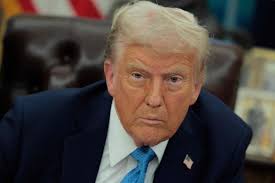On Saturday, Mexican President Claudia Sheinbaum announced the imposition of retaliatory tariffs in response to the United States’ decision to levy a 25% tariff on all goods imported from Mexico. This move marks the beginning of a trade war between the two neighboring nations, intensifying economic tensions.
In a detailed statement posted on X (formerly Twitter), Sheinbaum emphasized that while Mexico values diplomatic dialogue over conflict with its largest trade partner, the government felt compelled to respond with equivalent measures. She reiterated Mexico’s commitment to maintaining strong economic ties with the U.S. but stressed that the unilateral tariffs imposed by Washington left her administration with no choice but to take action to protect the country’s economic interests.

President Claudia Sheinbaum announced on X that she has directed Mexico’s economy minister to activate a contingency plan, referred to as “Plan B,” in response to the United States’ newly imposed tariffs. This plan includes a combination of tariff and non-tariff measures designed to safeguard Mexico’s economic interests. However, Sheinbaum did not disclose which specific U.S. goods would be targeted by these countermeasures.
For decades, Mexico and the United States have built a deeply interconnected trade relationship, with goods flowing freely across the border. This includes a highly integrated automotive industry, where parts and vehicles are manufactured and assembled across both countries. Additionally, vast quantities of crude oil, natural gas, and motor fuels are exchanged regularly, underscoring the economic interdependence of the two nations. The newly escalating trade tensions threaten to disrupt these long-established commercial ties, raising concerns about potential economic fallout on both sides.
In addition to the automotive and energy sectors, the trade relationship between Mexico and the United States also thrives in agriculture, with a booming exchange of farm products. Mexico exports significant quantities of fresh produce, including avocados and tomatoes, to the U.S. market, while U.S. farmers supply Mexico with large volumes of essential grains like corn, as well as other agricultural products.
The United States remains Mexico’s largest trading partner, and in 2023, Mexico surpassed China as the leading destination for U.S. exports. This underscores the critical economic ties between the two nations, which are now facing heightened tensions due to the newly imposed tariffs.
In response, Mexico has been preparing a series of retaliatory tariffs on U.S. imports, with potential rates ranging from 5% to 20%. These tariffs could target a wide array of goods, including pork, cheese, fresh produce, and manufactured items such as steel and aluminum. However, sources familiar with the situation have indicated that the automotive sector would likely be excluded from these retaliatory measures, at least in the initial stages of Mexico’s response.
Mexico’s Economy Minister, Marcelo Ebrard, voiced strong condemnation of the U.S. tariffs, describing them as a “flagrant violation” of the U.S.-Mexico-Canada Agreement (USMCA). In a post on X, Ebrard reaffirmed that Mexico was moving forward with its contingency plan, stating, “Plan B is underway,” and expressing confidence in the country’s ability to prevail in the trade dispute, declaring, “We will win!”
According to data from the U.S. Census Bureau, U.S. exports to Mexico exceeded $322 billion in 2023, while the U.S. imported more than $475 billion worth of goods from Mexico. These figures highlight the scale of bilateral trade, emphasizing how deeply the two economies are interconnected.
Moreover, economic analysis from Gabriela Siller, the director of Grupo Financiero BASE, revealed the extent to which Mexico’s economy is tied to exports to the United States. Nearly one-third of Mexico’s gross domestic product (GDP) is directly dependent on these exports, underscoring the potential economic stakes for Mexico in this trade conflict.
Gabriela Siller, the director of economic analysis at Grupo Financiero BASE, warned that the imposition of a universal 25% tariff on Mexican goods could lead to a significant decline in exports, with an estimated drop of around 12%. This reduction in trade would have broader economic implications, potentially causing Mexico’s GDP to shrink by 4% in 2025 if the tariffs are sustained throughout the year.
In addition to the economic impact, President Claudia Sheinbaum used her platform on X to firmly reject allegations from the White House that the Mexican government has colluded with drug cartels. She described these claims as “slander,” pushing back against the narrative promoted by the Trump administration. The accusations had been used to justify the tariffs, with former President Trump arguing that Mexico’s failure to prevent the flow of fentanyl—an extremely lethal opioid—into the United States, coupled with what he called “uncontrolled migration,” were key reasons behind the tariffs.
President Claudia Sheinbaum highlighted her government’s efforts since she assumed office in October, emphasizing its significant actions against the illegal drug trade. She proudly pointed out that her administration had seized 20 million doses of fentanyl, a major step in combatting the opioid crisis. Additionally, more than 10,000 individuals connected to drug trafficking had been apprehended, demonstrating Mexico’s commitment to addressing the issue.
Ricardo Monreal, the leader of Mexico’s ruling party in Congress, expressed strong criticism of the U.S. measures, describing the tariffs as “one of the heaviest attacks Mexico has received in its independent history.” In an interview with the broadcaster Milenio, Monreal framed the U.S. tariffs as a severe and unprecedented move, underscoring the gravity of the situation and the broader implications for Mexico’s sovereignty and economic stability.


Comments are closed, but trackbacks and pingbacks are open.